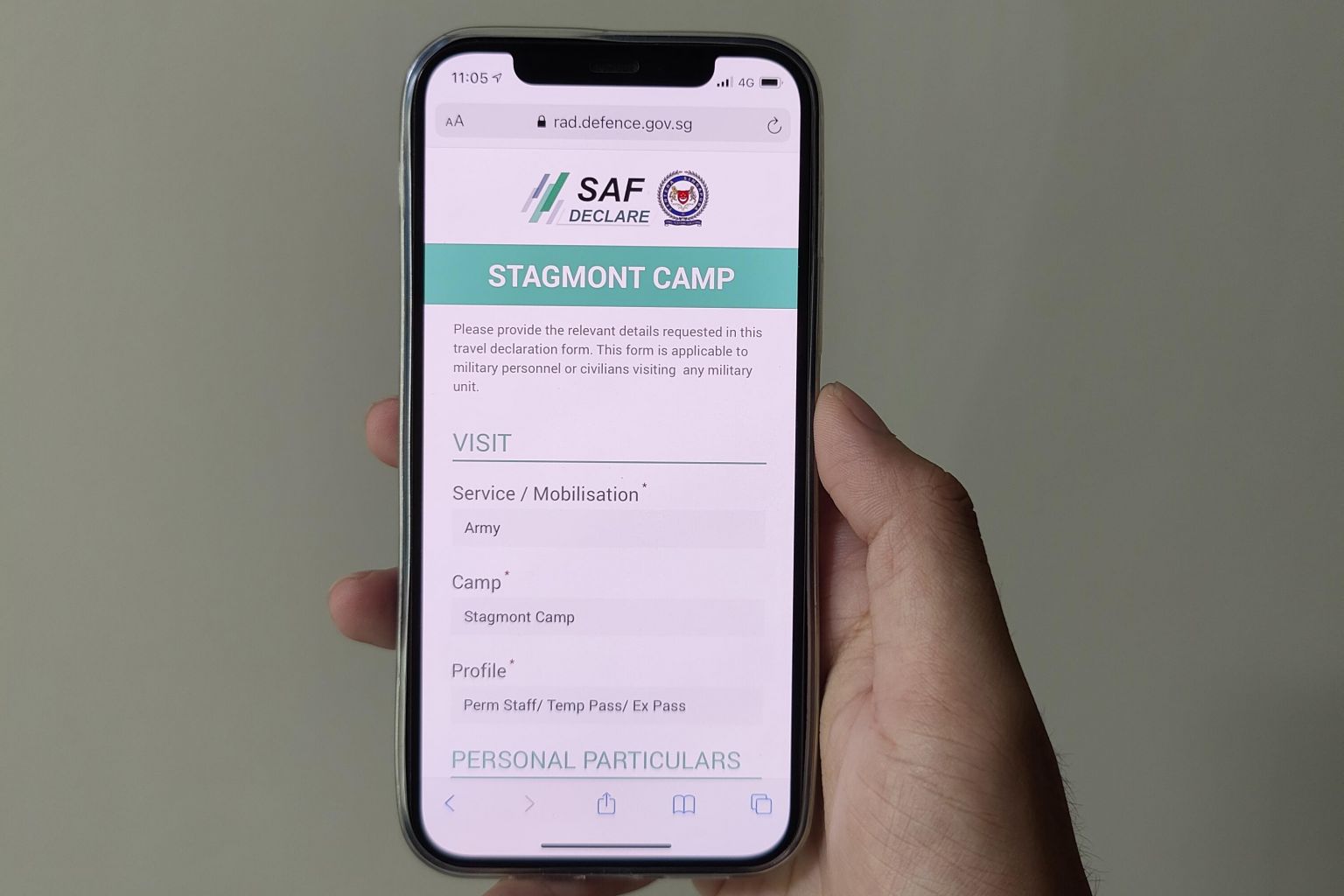Singapore Army's Covid-19 digital declaration form bags innovation award
Sign up now: Get ST's newsletters delivered to your inbox

The SAF Declare digital declaration form for visitors to fill in before entry to SAF camps was developed by a team from the Army Digitalisation Office.
PHOTO: MINDEF
SINGAPORE - In February last year, as Covid-19 hit Singapore, army camps had to screen visitors by asking them to fill in paper forms, with questions such as whether they had any flu symptoms or had travelled to affected countries recently.
Filling in these travel declaration forms resulted in long queues at guard rooms, which could potentially lead to the spread of the virus, said Captain Chia Teck Yeow, who is from the army's digitalisation office.
Within that month, his team developed a digital form using FormSG, a form builder tool developed by the Government Technology Agency (GovTech), to reduce human contact while keeping proper records of visitors to camps.
Visitors can access the form via a website link or by scanning a QR code.
The Army Declare app, which was also adopted by the navy and air force in September last year, is still in use today.
It now uses a Web portal so that the data collected can be better managed, with the help of the Defence Science and Technology Agency, said Capt Chia, 28.
The project was one of the nine winners of the Ministry of Defence (Mindef) Dare To Do Award, which was announced by Mindef on Thursday (June 24).
The award recognises efforts that have identified new ways to do things better, take measured risks and show perseverance.
Defence Minister Ng Eng Hen officiated at the Innovation Symposium at Mindef's headquarters in Bukit Gombak on Thursday, during which a small-scale awards ceremony was held.
A total of 65 awards were presented to individuals, groups and units from Mindef and the Singapore Armed Forces (SAF), in recognition of their innovations and work improvement efforts. These led to savings of more than $165 million in the last financial year.
In his speech, Dr Ng said he was glad that there were recipients for the innovation awards despite the Covid-19 pandemic.
"It reflects a good resilience among our own people that has been cultivated within Mindef and SAF - an ethos that places national defence as a priority, whatever the circumstances, that there's this drive for innovation and excellence, and to find better ways of doing things to improve outcomes," he said.
Examples of this innovation drive, he said, include engineers at DSO National Laboratories optimising their in-house polymerase chain reaction (PCR) test capability for the SAF to detect Covid-19 infection in its ranks, as well as add to the national capacity to do so.
"It's a capability that enabled us to plan and to execute cohorting, testing, calling back our NSmen (operationally ready national servicemen) or getting our critical units to continue their operations. It is a key asset that has kept our infection rates within the SAF down," said Dr Ng.
When the frigate RSS Supreme participated in Exercise Rimpac held in the waters off Hawaii last year, the ship was reconfigured to have its own testing capability, isolation and quarantine rooms, as well as specialised medical facilities to manage potential Covid-19 cases, Dr Ng said.
Similar protocols have since been implemented for all ships as part of deployment preparations.


The new Smart Padlock system (left) compared to a conventional lock and key.
PHOTO: MINDEF
Another project that won the Dare To Do Award was a smart padlock by the 5 Air Engineering and Logistics Group from the Republic of Singapore Air Force.
Instead of using conventional lock and keys, where a single key opens each lock, the team developed an electronic lock solution where a programmable key can be used to access multiple locations, such as offices or aircraft hangars, where servicemen are required to work at Tengah Air Base.
This saves on the time that is usually spent hunting for the right key if another user across the airbase is holding it, said Military Expert 5 Desmond Loh, 51, an air force engineer who headed the project.
This solution is also more secure, as each key's use can be tracked, and access revoked when needed, he said.
When the team came up with this idea in 2019, it knew that among the challenges was how airbase security was "strict and non-negotiable".
"However, when faced with these processes that seem inefficient, our team decided to convince the authorities that there's indeed a better solution that, at the same time, doesn't compromise security," ME5 Loh said.


